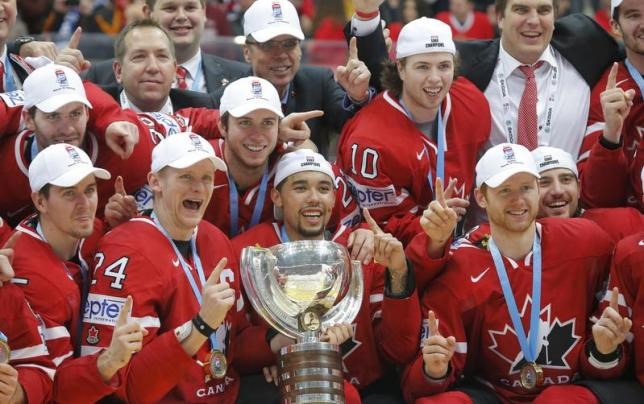The final games of the 2016 World Championships were on Sunday, with Russia taking on the US in the bronze medal game and Canada facing the undefeated Finns in the main event. Only one Canuck was in the lineup, as Chris Tanev played a key role for Canada while Ben Hutton and Thatcher Demko took in their respective games from the press box.
For various reasons, I wasn't able to watch the games until Monday, so here's a slightly belated recap.
Canada 2 - 0 Finland
Finland handed Canada their only loss in this tournament, so it seems fitting that Canada return the favour. Finland nearly had a storybook tournament, never allowing more than two goals in a game. Unfortunately for them, Canada didn’t even need two goals.
Connor McDavid scored the only goal that mattered, picking a great time to score his first of the tournament. He picked up a blocked Matt Duchene shot, made a quick move to his forehand, and roofed the puck.
At the other end of the ice, Chris Tanev and Canada’s defence shut down Finland’s offence, allowing just 16 shots on goal. When those shots did come, Cam Talbot was superb in net, making some truly stunning saves.
Tanev had his best game of the tournament, with 21:38 in ice time, including a team-high 8:37 in the third period as Canada defended their one goal lead. He barely left the ice in the final minutes of the game, as head coach Bill Peters placed a ton of trust in the team’s oldest player on the blue line.
Seriously, it was tough to keep track of the number of promising Finnish rushes that died on Tanev’s stick. Canada didn’t spend much time in their own end of the ice when Tanev stepped off the bench.
Tanev turned some heads at this tournament—Ray Ferraro was particularly taken with his play. From a defensive perspective, he was arguably the best defenceman in the tournament, as he and his defence partner, Morgan Rielly, weren’t on the ice for a single goal against at even-strength. Considering that they consistently played against their opponents’ top lines, that’s impressive.
Alas, his teammate Michael Matheson, a Florida Panthers prospect who was one of the tournament’s top-scoring defenceman, was named the best defenceman at the tournament, despite frequently skating as Canada’s seventh defenceman and getting pillowy-soft usage when he was on the ice. His offensive game was definitely eye-catching, though.
Tanev also played a major role on Canada’s tournament-best penalty kill that allowed just two goals against in 29 opportunities. He may have only had one point, an assist, but he was one of the most important players on Team Canada.
In a nice touch, Ben Hutton was dressed and ready to take the ice in his full gear to celebrate the gold medal with his teammates. His smile seemed bigger than anyone else’s.
Russia 7 - 2 USA
A young lineup for the USA just wasn’t a match for Russia on home ice, as Russia took home the bronze medal with a dominant performance.
It didn’t help that Keith Kinkaid reverted to his early tournament self. Though he didn’t have much chance on a couple of the five goals scored on him, which came from nice passing plays eating holes in the US defence, he didn’t look good on either of the two goals scored on him in the first period.
Mike Condon came in for the third period and gave up two more goals. He finished the tournament with an .878 save percentage, while Kinkaid finished below him with an .871 save percentage.
Look, I’m not saying that Thatcher Demko would have been a difference maker—USA’s defence was very green and gave up a lot of great scoring chances—but it was easy to see that . While Kinkaid was legitimately very good in the quarterfinal game that sent USA to the medal round, that was the only game where USA's goaltending really made a positive difference.
It just seems odd that Demko never had a chance to take the net after Kinkaid and Condon struggled early on in the preliminary round.
Ìý



